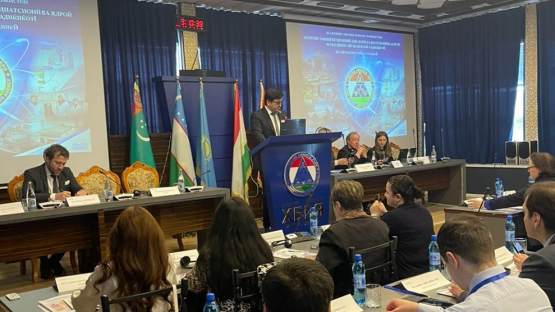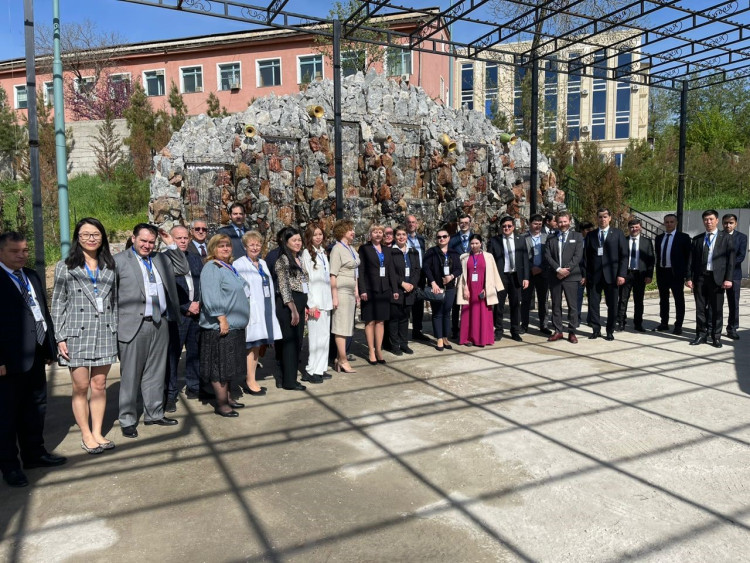Central Asia is showing increased interest in nuclear power as a sustainable and reliable source of energy. Uzbekistan has started preparations for the construction of its first nuclear power plant and the Kazakhstan Ministry of Energy has recently proposed the potential reintroduction of nuclear power to reduce the country’s reliance on fossil fuels. The role that nuclear power can play to improve energy security in the region, as well as reduce greenhouse gas emissions is being increasingly explored. These steps towards the reintroduction or development of nuclear power programmes requires robust nuclear law frameworks.
The IAEA plays an essential role in enabling countries to benefit from these and other peaceful uses of nuclear technology by helping them create the necessary legislative frameworks to enhance the safety and security of their nuclear facilities and materials. A recent IAEA workshop supported countries to meet this task. To discuss the legislative dimension of the nuclear sector and bring into the spotlight the key frameworks of nuclear law, the IAEA Regional Workshop on Nuclear Law was organized from 28 to 31 March in Dushanbe, Tajikistan. The workshop was attended by 24 representatives from 11 countries — Armenia, Belarus, Bulgaria, Georgia, Kazakhstan, Latvia, Republic of Moldova, Russian Federation, Tajikistan, Turkmenistan and Uzbekistan.
“Nuclear energy has the potential to provide a significant contribution to the world’s energy needs while reducing carbon emissions. But it also presents unique legal challenges that need to be addressed. As such, the importance of nuclear law cannot be overemphasized,” said lhom Mirsaidzoda, the Director of the Chemical, Biological, Radiological and Nuclear Safety and Security Agency of Tajikistan. “This workshop is the first IAEA activity of this type which is held in Tajikistan, and we are honoured to host such an event. It is a wonderful opportunity for Tajikistan to have such a forum to discuss topics on nuclear law, as well as to share experiences in the region”.
“The workshop was very informative and beneficial to us, since Armenia is currently in the process of a new draft law, aimed at strengthening the national legal framework, harmonizing the national regulation with EU directives and expanding the nuclear programme,” said Hrachya Yavroyan, Head of the Radiation Safety Department at the Armenian Nuclear Regulatory Authority. “We would welcome further legislative assistance to benefit more from the bilateral legislative review assistance from the IAEA.”
As part of the workshop, representatives from each country presented on the nuclear sector and nuclear legislation in their own countries. Even countries with past experience of working with nuclear law may wish to expand their knowledge of the subject, as legislators may still face challenges and require legislative assistance prior to enacting laws, for example, with regards to complex topics, such as liability for nuclear damage.
“Kazakhstan has enjoyed many years of cooperation with the IAEA, including as host of the IAEA Low Enriched Uranium Bank, and this workshop is a great opportunity for us to further gain knowledge and benefit more from the IAEA Legislative Assistance Programme to improve our national legal framework further,” said Ms Gulbarshyn Kanagatova, Chief Expert of the Committee of Atomic and Energy Supervision and Control of the Ministry of Energy of the Republic of Kazakhstan.
IAEA experts present at the workshop provided a comprehensive overview of the main aspects of nuclear lawmaking, focusing on major international legal frameworks for nuclear safety, security, safeguards and liability. The experts summed up key elements making up a comprehensive National Nuclear Law and helped to address some of the complex legislative terminology. They also explained the functions of the IAEA’s Legislative Assistance Programme and the benefits it offers for Member States. In addition, they were able to provide legislative assistance through bi-lateral discussions with all interested parties.
Assistance under the IAEA Legislative Assistance Programme is available to all countries, upon request, irrespective of the scope of activities and facilities in each country.
This workshop was also the first IAEA regional workshop on nuclear law conducted in the Russian Language. “The level of participation in the discussions and the issues raised, highlights the value of conducting such activities in the official languages of the Agency”, said Anthony Wetherall, Head of the Nuclear and Treaty Law Section of the IAEA. “The workshop included discussions on a complex issue for many countries, namely improving national legal frameworks comprised of multiple pieces of legislation including general laws applicable to nuclear activities. Finally, the bilateral discussions enabled us to informally agree upon future legislative assistance activities for the represented countries in response to identified specific needs”.





